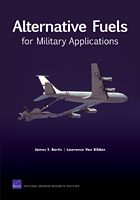RAND National Defense Research Institute has released a study today amidst a firestorm of criticism with many claiming that the report sounds like an advertisement for the coal industry. The study, commissioned by the Department of Defense, was to conduct an examination of alternative fuels for military applications. For the past several years, the military has been testing alternative fuels, including biodiesel and algal fuels, in aviation and marine applications and has set clear goals to use alternative fuels by 2016 and beyond.
 The report concludes that in the short term, “considering economics, technical readiness, greenhouse gas emissions, and general environmental concerns, FT fuels derived from a mixture of coal and biomass represent the most promising approach to producing amounts of alternative fuels that can meet military, as well as appreciable levels of civilian, needs by 2030.”
The report concludes that in the short term, “considering economics, technical readiness, greenhouse gas emissions, and general environmental concerns, FT fuels derived from a mixture of coal and biomass represent the most promising approach to producing amounts of alternative fuels that can meet military, as well as appreciable levels of civilian, needs by 2030.”
The report continues by saying, “It is highly uncertain whether appreciable amounts of hydrotreated renewable oils (biodiesel) can be affordably and cleanly produced within the United States or abroad.” The report questions whether renewable fuels can ramp up to commercial scale, be economically competitive and it questions their ability to reduce greenhouse gas emissions. All of these issues rule biodiesel and algae out, where too much money and resources are being spent, according to the report, as being a viable candidate to meet the military need’s over the next decade.
If these findings weren’t enough to stir up the hornet’s nest, the report also called for Congress to reconsider the military’s budget for alternative fuel-projects. This is a sure-fire way to invoke debate in Washington, especially as a Republican Congress searches for ways to cut the federal budget.
In a New York Times article, the report elicited quick criticism. “Unfortunately, we were not engaged by the authors of this report,” said Thomas W. Hicks, deputy assistant secretary of energy for the Navy. “We don’t believe they adequately engaged the market,” he said, adding, “This is not up to RAND’s standards.”
In an uncommon agreement, both biofuel groups and the environmental industry criticized the RAND report saying that it “underestimated the viability of algae and overestimated the availability and efficacy of carbon capture and storage technology.”
Paul Winters, a spokesman for the Biotechnology Industry Organization said in the article, “This would not be the first example of a military-driven research project where the civilian benefit far outweighs the military benefit. Witness the Internet.”
 One area in which the report was very hung up was in the greenhouse gas reduction of the alternative fuels and cites that the Energy Independence and Security Act of 2007 requires that any alternative and synthetic fuels bought by federal agencies for “mobility-related use” must have the same or lower greenhouse gas emissions than those of conventional fuels using 2005 levels. The RAND report argues the GHG reductions are not significant enough to continue to pursue research.
One area in which the report was very hung up was in the greenhouse gas reduction of the alternative fuels and cites that the Energy Independence and Security Act of 2007 requires that any alternative and synthetic fuels bought by federal agencies for “mobility-related use” must have the same or lower greenhouse gas emissions than those of conventional fuels using 2005 levels. The RAND report argues the GHG reductions are not significant enough to continue to pursue research.
A long-standing debate has been whether biofuels, both ethanol and biodiesel, offer lower GHG emissions as compared to other fuels such as conventional gasoline. The biofuels industry argues biofuels lower GHG emissions, even when factoring in unproven theories such as indirect land use, while biofuel opponents argue that biofuels actually increase GHG emissions.
Ultimately the RAND report concludes that the most promising fuels will be produced using the Fischer-Tropsch process, and more specifically, to turn a combination of coal and biomass into liquid fuel. However, to counter GHG emissions, there will have to be substantial carbon sequestration technology attached to the process, but the authors do not feel this is a deal-breaker, regardless of the fact that no proven, commercially available technology of the sort is currently available.
Executive Director Mary Rosenthal, in a statement on the Algal Biomass Organization’s website in response to the study, stated, “The positioning of the entire US algae industry as a “research topic” is patently false. We have more than 100 companies, academic institutions and national laboratories working to develop the algae-to-fuels industry. Algae-derived fuels have already been tested and/or used in motor vehicles and commercial aircraft, and last fall’s successful test of a Navy Riverine Command boat showed that algae fuels are ready for use. It is unclear to us whether or not any actual “green” CTL fuels have been produced or tested.”
Rosenthal continued, “We believe algae commercialization is far closer than RAND suggests. A 2010 report by Greentech Media Research projected annual US production of 6 billion gallons of algae fuel by 2022. On the contrary, the RAND report calls the potential for commercial production of CTL fuels over the next decade “very limited.”
She concluded, “We will continue to work on behalf of the US algae industry to inform policymakers of the true potential of algae-based fuels as a long term, viable source of renewable fuels for the military.”

